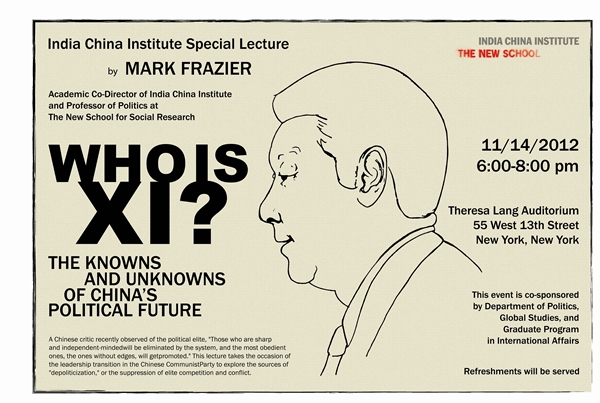
Who is Xi? The Knowns and Unknowns of China’s Political Future
November 14, 2012 , 6:00 pm – 8:00 pm

Who is Xi?
A Chinese critic recently observed of the political elite, “Those who are sharp and independent-minded will be eliminated by the system, and the most obedient ones, the ones without edges, will get promoted.”
Xi Jinping will be promoted to the top leadership position of the Chinese Communist Party at its 18th Party Congress, set to begin on November 8. This leadership succession, which last took place in 2002, puts Xi as “first among equals” in a collective leadership group comprising the Politburo and its Standing Committee–also to be unveiled at the Party Congress.
Xi Jinping’s recent speeches have been used by analysts to make a wide range of conflicting claims about China’s future. This lecture takes the occasion of the leadership transition to reflect on the study of Chinese politics and the sources of what has been termed “depoliticization,” or the suppression of competition and debate among China’s political elite. It is argued that this depoliticization is a relatively recent phenomenon, and a return to earlier party traditions of debate and deliberation is much needed to revitalize politics and public policy. This scenario is more likely than conventional claims that China is in some imagined “transition” toward democratization or other forms of regime transformation.
About Mark Frazier
Mark Frazier teaches and writes about the political economy of China. In the Fall of 2012, he joined The New School as Academic Co-director and Endowed Professor at the India China Institute and Professor at the Department of Politics. To his new role, Frazier brings two decades of research on political economy and labor politics in China and on Chinese-Indian relations. Frazier, who most recently was Associate Professor and Chair of the Department in International and Area Studies at the University of Oklahoma, earned his Ph.D. in political science from the University of California, Berkeley. He is the author of Socialist Insecurity: Pensions and the Politics of Uneven Development in China (Cornell, 2010) and The Making of the Chinese Industrial Workplace: State, Revolution and Labor Management (Cambridge, 2002). His recent research examines the politics of labor and social policies in China.
